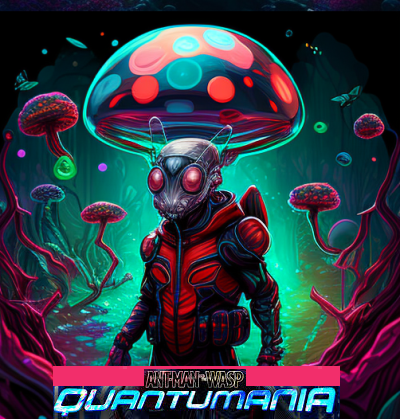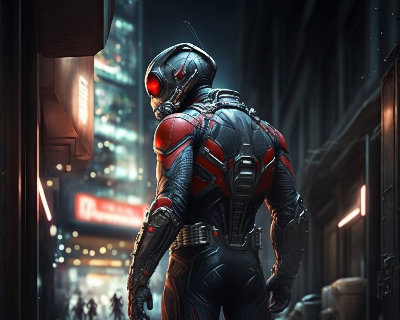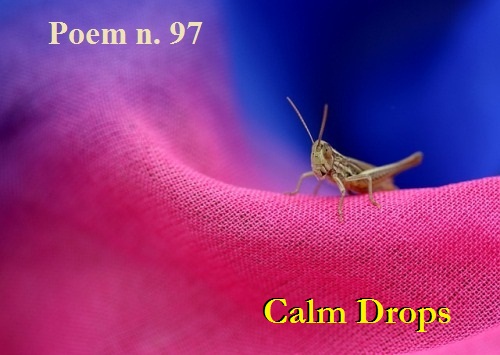Ant-Man
and The Wasp: Quantumania.
Psychology Version.
Cassie, Hope and Hank have invented a telescope to study
and map of the Quantum Realm. Cassie
sends a signal into the Quantum Realm. Janet
says to disable the device. Suddenly, everyone is sucked into the Quantum
Realm: In
order to overcome some psychic traumas,
it’s necessary and essential to rediscover one's emotional experiences and memories lived in the past. In this analytical context, Cassie is the person who, realizing
that she has psychic discomfort, tries to recover past memories and notions that may have caused malaise and mental discomfort. At the same time, Janet portrays an Ego which, on the contrary, doesn’t want to remember the traumas experienced... for fear of
suffering and for fear of not being able to manage unconscious emotions and wounds.
In the subatomic universe
called the Quantum Realm, our heroes encounter a rebellious people; who
say that Kang destroyed their homes
and that he built a citadel on the remains of their people. For this reason,
the rebels have banded together to fight him: If a child has had coercive,
aggressive and unloving parents (Kang), deep within the child some inner
faculties can be destroyed or annihilated
(destroyed houses of the rebels),
such as for example the ability to be spontaneous,
sincere or creative. In other words, sometimes there are parental figures that
impose their selfish desires on their
children; just like Kang did, who destroyed the homes of the rebels. A loving parent must advise and
educate their children, but must not
impose their will on the descendant too coercively. For example, if a son
doesn’t like soccer, but he wants to become a dancer, a family member may
disapprove of this event, and tell the son that he is a loser or a sissy. The
child who feels mocked by a parent,
for the simple reason of having expressed his own opinion, can lose self-esteem, and consequently can
become fragile and brittle, on an emotional
level. Growing up, the descendant may also have relational problems with
people who unconsciously, remind him
of the too strict and oppressive parent.
Modok states that he picked up Cassie's
signal, and brought them into the Quantum
Realm. And in the end, Modok helps
our heroes defeat Kang: Modok's deformed
physique, symbolizes the person who in his heart has failed to evolve his real personality, in a balanced way. It
is no coincidence that in order to truly be himself, an adult must have had positive feedback from his parents, who
must support him in the development of his inner faculties... which wish to develop dynamically. Furthermore, Modok who has a child's body symbolizes precisely this remaining "infant" while physically being an adult. Basically, sometimes it happens
that the mental age of the person
doesn’t correspond to the physical age.
An adult who had parents who didn't love and support him in his personal or psychological choices, remains like a child… who still hasn't managed to grow emotionally. One of the results of
this psychic event, we can observe it from some people who are insecure, distrustful and always
looking for external approval. Just
like a child who has to ask a parent
how to act before making a decision. In the movie all this, we perceive from Modok who totally depends on Kang's decisions,
without real critical discernment.
Janet reveals to everyone that in the past
she has known Kang, who was trapped
like her, in the Quantum Realm. Kang
lying to her, he had told her that he was a scientist off course. So Janet helped him recharge the energy core of his ship, to be able to
return to his world: We must all know that our current
knowledge of the world around us, are united and conjoined with knowledge, desires, concepts and thoughts of our family members. Ultimately, when we make a decision, when we
reflect on something, in addition to our decision-making point of view… we also
have a part of the opinions and
concepts of our family members. In
this narrative context, Janet, who
follows and believes in Kang, is the
person who, even when she becomes an adult, can unconsciously make wrong
decisions, which have been introjected
in childhood. We can give an example… sometimes those who have racist parents, even though they are
not racist… feel deep down that they have prejudices
and preconceptions towards people of another nationality. In practice, the
ideas and thoughts of a family
member sometimes enter our unconscious
memory; and when we least expect it, they pop up… hindering us in our personal decisions.
After years of trying, Janet and Kang restore the ship, which is
connected to Kang's thoughts. Janet peers into Kang's mind, and discovers that
Kang has destroyed entire worlds and timelines: Loving and balanced
parents, help their children become balanced
people with healthy self-esteem. We can understand how introjected parental
figures become positive role models
to follow. In fact, the just and fair behavior of parents, support the choices of children in the various
problems of life. But on the contrary, if the parents have been unloving,
castrating, cold and unfriendly, the children will introject contradictory parental figures (Kang), who push their children to
become fragile, problematic, insecure
people with low self-esteem. To
overcome this adverse event, it’s necessary to become aware of the
unconsciously introjected negative
thoughts, and rework them in a constructive and positive way. Jane who realizes that she has helped a
perfidious person like Kang; effigies precisely this awareness
on the part of a son, of having been unconsciously
a slave to negative and harmful preconceptions, unknowingly learned and assimilated in childhood.
Janet realizes that Kang has been
confined to the Quantum Realm by variants of him; the only place it can
hold him: Respect and love towards a parent is a wonderful and positive event; however, when family
members have been treacherous, selfish, and castrating, children may develop unconscious anger at the harmful
attitudes experienced in their family habitat. Relegating these unpleasant and
painful emotions to the unconscious… helps descendants not to hate their family members. Unfair parents must be forgiven; otherwise repressed anger can be translated and transferred onto other people in the present. The psychic mechanism called "Projection" works just like this;
in other words… the anger and wrath
one has towards a parent who has
abused us, is projected onto other people. This explains one of the
reasons why sometimes we react
impulsively and uncontrollably to people who have made small mistakes. The
outrageous reaction of anger and
rage… comes from years of repressed
resentment towards one's parental figures.
Kang says time is a cage, and then tries to get Janet
to follow him… by telling her it will take her back in time to her daughter.
Janet refuses and destroys the energy core, causing it to explode: To destroy the negative thoughts introjected into an
unloving family environment, we need to become aware of the traumas we
have experienced, and then rework them
with love and balance. For this
wonderful event of inner liberation, we need time and patience.
Kang wants
the power core through the Pym Particles, after which he yearns to
eliminate the worlds and any
universe he deems to be a threat to him.
Janet tells him that he is a monster: Sometimes it can happen that a child, in order to survive in a family environment that is resentful and full of hostility, unconsciously builds a
"False Self", in other words
a fictitious personality that he is
able to diligently follow and obedience, family dynamics filled with
malevolence. This psychic event "saves"
the child from suffering from the parents, but nevertheless limits the real identity of the child, who as he grows up… risks becoming a split person, with psychic problems and
insecure. In a nutshell, the "False
Self" (Kang) will begin to hate the "True Self" (Ant-Man),
and will wage war against him for
the conquest of the entire personality.
Kang declares
that conquerors destroy worlds that don't
work, and forge a new one. Janet
tells him that he seeks only revenge,
because he was exiled from its variants: Sometimes we wonder why some parents fail to love their
children for who they really are, accepting them with their real personalities,
without yearning to mutate and change their personalities of their descendants
as if they were plasticine. One of
the reasons why some parents hate their children… is that hatred for children
is actually… an unconscious aversion
to one's parents. In short, if an
individual experiences unconscious anger
towards his parents, he risks transferring this resentment… onto his
own children. In this case, the parent (Kang)
seeks revenge for the mistreatment
experienced in childhood, trying to make the children suffer. Let's try to give
some examples... an adult who has not been welcomed with love by his family,
will feel hatred towards his own children, who become victims of unconscious revenge and therefore deprive them of love and attention. In
other words, a wounded adult full of
repressed anger, risks venting his
frustrations by treating his children with carelessness, little love, modest
respect and anger. Usually, these adults will justify these unfair
behaviors with thoughts full of rationalism,
telling themselves that their children deserved to scold them, that they are
slackers, that they are rebels, that they are stupid and so on.
When all seems lost, Hank's
huge and intelligent evolved ants
arrive, and defeat the warriors in Kang's service. Finally, Scott Lang and Hope defeats Kang… and
they all return to the traditional world: To escape from this psychic cage full of repressed revenge and anger, we need to
recover our real identity and fortify ourselves with humility, patience and
above all… forgiveness. In short,
only by forgiving the repressed anger and memories connected to it will they fade
away; and children will no longer become a scapegoat
to vent their unconscious and latent anger and frustrations.
----------------------------
Ant-Man
and The Wasp: Quantumania.
Versante Psicologico.
Cassie, Hope e Hank hanno inventato un telescopio per studiare e mappare il regno quantico. Cassie invia un segnale
nel regno quantico. Janet dice di disattivare il congegno.
Improvvisamente, tutti vengono risucchiati nel regno quantico: Per poter
superare alcuni traumi psichici,
occorre e necessita riscoprire le
proprie esperienze emotive e ricordi vissuti nel passato. In questo contesto
analitico, Cassie è la persona che
comprendendo di avere dei disagi psichici, cerca di recuperare ricordi e
nozioni del passato che possono aver provocato malesseri e disagi mentali. Al
contempo, Janet effigia un Io che al contrario, non vuole
rammentare i traumi sperimentati… per paura di soffrire e per timore di non saper gestire le emozioni e ferite inconsce.
Nell’universo subatomico chiamato regno quantico, i nostri eroi incontrano un popolo di ribelli; i quali dicono che Kang ha distrutto le loro case e che ha
costruito una cittadella sulle spoglie del loro popolo. Per questo motivo, i
ribelli si sono uniti per combatterlo: Se un bambino ha avuto dei genitori
coercitivi, aggressivi e poco amorevoli (Kang),
nell’intimo del fanciullo alcune facoltà interiori possono venir distrutte o annichilite (case distrutte
dei ribelli), come ad esempio la capacità di essere spontanei, sinceri o creativi. In altri termini, a volte ci sono
figure genitoriali che impongono i
loro desideri egoistici ai loro
figli; proprio come ha fatto Kang,
che ha distrutto le case dei ribelli. Un genitore amorevole deve consigliare e
educare i figli, ma non deve imporre
al discendente la propria volontà in maniera troppo coercitiva. Ad esempio, se
a un figlio non piace il calcio, ma vuole divenire un ballerino, può capitare
che un familiare disapprovi questo evento, e dica al figlio che è un perdente
oppure una femminuccia. Il figlio che si sente deriso e schernito da un genitore, per il semplice motivo di aver
espresso una propria opinione, può perdere la stima in se stesso, e di conseguenza può divenire fragile e labile,
a livello emotivo. Crescendo, il discendente può anche avere dei problemi
relazionali con persone che inconsciamente,
gli ricordano il genitore troppo severo e opprimente.
Modok enuncia che ha captato il segnale di Cassie, e li ha portati nel regno quantico. E alla fine, Modok
aiuta i nostri eroi a sconfiggere
Kang: Il fisico di Modok deformato, simboleggia la persona che
nel proprio intimo non è riuscita a evolvere la propria reale personalità, in maniera equilibrata. Non a caso, un adulto
per essere veramente se stesso, deve aver avuto dei feedback positivi da parte dei genitori, i quali lo devono
sostenere nello sviluppo delle sue facoltà interiori… le quali desiderano
svilupparsi in maniera dinamica. Inoltre, Modok
che ha un corpo da bambino, simboleggia proprio questo rimanere “neonati” pur essendo fisicamente degli adulti. In sostanza, a volte capita che
l'età mentale della persona, non
corrisponde all'età fisica. Un
adulto che ha avuto genitori che non l’hanno amato e sostenuto nelle sue scelte
personali, lavorative o psicologiche, rimane come un fanciullo che ancora non è
riuscito a crescere a livello emotivo.
Uno dei risultati di questo evento psichico, lo possiamo osservare da alcune
persone che sono insicure, sfiduciate e sempre alla ricerca di approvazioni esterne. Esattamente come un bambino che deve chiedere a un
genitore, come agire prima di prendere una decisione. Nel film tutto questo, lo
percepiamo da Modok che dipende totalmente dalle decisioni di Kang, senza un reale discernimento
critico.
Janet rivela a tutti, che in passato ha conosciuto Kang, il quale era intrappolato come lei, nel regno quantico. Kang
mentendole, le aveva detto che era uno scienziato fuori rotta. Così Janet l'ha
aiutato a ricaricare il nucleo energetico
della sua navicella, per poter tornare nel suo mondo: Dobbiamo tutti sapere che
le nostre attuali cognizioni del
mondo che ci circonda, sono unite e congiunte a conoscenze, desideri, concetti e pensieri dei nostri familiari. In definitiva, quando
prendiamo una decisione, quando riflettiamo su un qualcosa, oltre al nostro
punto di vista decisionale… abbiamo anche una parte delle opinioni e concetti dei nostri familiari. In questo contesto
narrativo, ecco che Janet, che segue
e crede a Kang, è la persona che,
anche se divenuta adulta, può inconsciamente
prendere decisioni sbagliate, che
sono state introiettate
nell’infanzia. Possiamo fare un esempio… a volte chi ha dei genitori razzisti, pur non essendo un razzista…
percepisce nell'intimo di avere dei pregiudizi
e preconcetti, verso persone di un'altra nazionalità. In pratica, le idee e
pensieri di un familiare, a volte si inseriscono nella nostra memoria inconscia; e quando meno ce
l'aspettiamo, saltano fuori… ostacolandoci
nelle nostre decisioni personali.
Dopo anni di tentativi, Janet e Kang
ripristinano la navicella, la quale
è connessa ai pensieri di Kang.
Janet scruta nella mente di Kang, e scopre che Kang ha distrutto interi mondi e linee temporali: I genitori amorevoli ed equilibrati, agevolano i figli a divenire
persone bilanciate e con una sana stima
in se stessi. Possiamo comprendere come le figure genitoriali introiettate,
divengono dei modelli positivi da seguire. Difatti, i
comportamenti giusti ed equi dei genitori, sostengono le scelte dei figli nelle
varie problematiche della vita. Ma al contrario, se i genitori sono stati poco amorevoli, castranti, freddi e
scostanti, i figli introietteranno figure genitoriali contraddittorie (Kang), che spingono i figli a divenire persone
fragili, problematiche, insicure e con una bassa stima in se stessi. Per
superare questo evento avverso, occorre prendere consapevolezza dei pensieri negativi introiettati inconsciamente, e rielaborarli in
maniera costruttiva e positiva. Jane
che si rende conto di aver aiutato una persona perfida come Kang, effigia proprio questa consapevolezza da parte di un figlio,
di essere stato inconsciamente schiavo
di preconcetti negativi e deleteri, appresi e assimilati inconsapevolmente
nell’infanzia.
Janet comprende che Kang è stato confinato nel regno quantico dalle sue varianti; l'unico posto che lo può
trattenere: Il rispetto e amore
verso un genitore, è un evento meraviglioso
e positivo; tuttavia, quando si hanno avuto familiari perfidi, egoisti e
castranti, i figli possono sviluppare una rabbia
inconscia verso gli atteggiamenti nocivi vissuti nel proprio habitat
familiare. Relegare queste emozioni spiacevoli e dolorose nell’inconscio, aiuta
i discendenti a non detestare i propri familiari. Occorre perdonare i genitori iniqui, altrimenti la rabbia repressa può essere traslata e trasferita su altre persone nel presente. Il meccanismo psichico
chiamato “proiezione”, agisce
proprio in questo modo; in altri termini… si proietta su altre persone la rabbia e collera che si ha verso un genitore
che ci ha maltrattati. Ecco spiegato uno dei motivi del perché alcune volte si
reagisce in maniera impulsiva e incontrollata,
verso persone che hanno compiuto piccoli errori. La reazione spropositata di collera e rabbia,
deriva da anni di rabbia repressa
verso le proprie figure genitoriali.
Kang dice che il tempo è una gabbia, e poi cerca di convincere Janet a seguirlo… dicendole che la
riporterà indietro dal tempo dalla figlia. Janet si rifiuta e distrugge il nucleo energetico, facendolo esplodere:
Per distruggere i pensieri negativi
introiettati in un ambiente familiare poco amorevole, necessita prendere consapevolezza dei traumi vissuti, e poi rielaborarli
con amore ed equilibrio. Per questo meraviglioso evento di liberazione
interiore, necessita tempo e
pazienza.
Kang vuole il nucleo energetico
attraverso le particelle Pym,
dopodiché agogna eliminare i mondi e ogni universo che ritiene essere una minaccia per lui. Janet gli dice che è un mostro:
A volte può capitare, che un bambino per sopravvivere
in un ambiente familiare astioso e colmo di ostilità, costruisca inconsciamente
un “Falso Sé”, in altri termini una
personalità fittizia che è in grado di seguire con diligenza e obbedienza, le
dinamiche familiari colme di malevolenza. Questo evento psichico, “salva” il bambino da patimenti da parte
dei genitori, ma tuttavia limita la reale identità del fanciullo, il quale
crescendo rischia di divenire una persona scissa, con problematiche psichiche e
insicura. In poche parole, il “Falso Sé”
(Kang) comincerà a odiare il “Vero Sé” (Ant-Man), e gli farà guerra per la conquista dell'intera
personalità.
Kang dichiara che i conquistatori
distruggono i mondi che non funzionano,
e ne forgiano uno nuovo. Janet gli
proferisce che lui cerca solo vendetta,
perche è stato esiliato dalle sue varianti:
A volte ci chiediamo del perché alcuni genitori non riescono ad amare i figli per quello che veramente
sono, accettandoli con le loro reali personalità, senza agognare mutare e
cambiare le personalità dei loro discendenti come fossero plastilina. Uno dei
motivi del perché alcuni genitori detestano i propri figli, risiede nel fatto
che l'odio per i figli in realtà… è un’avversione
inconscia verso i propri genitori.
Insomma, se un individuo prova una rabbia
inconscia verso i propri genitori, rischia di trasferire questo risentimento… sui propri figli. In questo caso, il genitore (Kang) cerca vendetta per
i maltrattamenti vissuti nell'infanzia, cercando di far soffrire i figli.
Proviamo a fare qualche esempio… un adulto che non è stato accolto con amore
dai suoi familiari, proverà astio
verso i propri figli, i quali diventano delle vittime di vendette inconsce e quindi li priveranno di amore e attenzioni. In
altri termini, un adulto ferito e
colmo di rabbia repressa, rischia di
sfogare le proprie frustrazioni
trattando i figli con disattenzione, poco amore, poco rispetto e rabbia. Questi
adulti di solito, giustificheranno questi comportamenti iniqui, mediante
pensieri colmi di razionalismo, dicendo a se stessi che i figli le sgridate se
le sono meritate, che sono dei fannulloni, che sono dei ribelli, che sono
stupidi e via dicendo.
Quando sembra
tutto perduto, arrivano le enormi e intelligenti formiche evolute di Hank,
e sconfiggono i guerrieri al
servizio di Kang. Infine, Scott Lang
e Hope sbaragliano Kang, e tornano
tutti nel mondo tradizionale: Per fuoriuscire da questa gabbia psichica colma di vendette e rabbie represse, necessita
recuperare la propria reale identità
e fortificarsi di umiltà, pazienza e
soprattutto del perdono. In breve,
solo perdonando, la rabbia repressa
e i ricordi connessi a essa, si dilegueranno; e i figli non diventeranno più un
capro espiatorio per sfogare le proprie rabbie e frustrazioni inconsce e latenti.
#Ant-ManandTheWaspQuantumania
#MarvelComics #Ant-Man #MarvelStudios
#TheWasp #Ant-ManandTheWasp
#flaviasanti #psichology #spiritual
#psicologia #psicoanalisi #psicoterapia #psico
#Religion #Faith #Prayers #Jesus_Christ
#literary #essaywriting #religione
#christian #cristiani #scifi
#Filmmaking #movie #fantasy
#hollywood #lungometraggio
#cinema
























